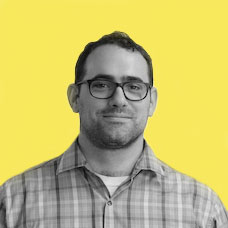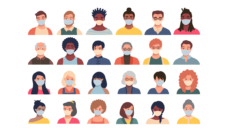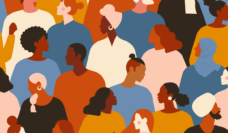Public Health Post: What do you feel is the biggest ethical challenge to creating a ventilator allocation plan?
Michael Gillette: We have dealt with allocation of scarce resources for a long time in a variety of different ways. There’s always been more demand than supply for healthcare generally, but even if we look at specific examples like organ procurement, there’s a long history in the philosophical literature, in the clinical ethics literature, of dealing with how you make decisions about who should receive a resource when there’s an insufficient supply for everyone who would benefit from it. But all of those discussions have historically taken the form of imagining multiple people in need of a resource. Five people come in needing a kidney, but one kidney is available, so you have one item that has not previously been claimed by anyone. You need to make a decision: of the five who could use it, how do we prioritize the recipient?
What really pushes the paradigm with Covid-19 is that we’re considering withdrawing the support from one patient in order to redirect it to another. So, it’s not just a question of prioritizing and distributing a scarce resource. It actually becomes an intentional choice to withdraw in order to reallocate, and we’ve never really had that conversation before. So, we’ve never talked about taking a kidney out of one living person without their consent in order to transplant it into somebody else.
In my region, the hospitals with which I work never had to get to the point of deciding to withdraw a ventilator, to extubate one patient in order to intubate another. What we’ve seen are more of the old-fashioned allocation of scarce resource issues where you had an unclaimed vial of Remdesivir and you had three people who needed it, and you had to decide who should get it.
How does social judgement affect decisions about which patients with Covid to save?
Health care providers are far more comfortable when we try to avoid in any way making social judgments. That is, they don’t feel that they are empowered by our system of government or by their training and experience to start making broad social judgments about who’s worth saving and who’s not worth saving. So, they would prefer very much to stay within their lane and just make decisions based on clinical presentation and avoid the rest of it.
One distinction that I make when talking about Covid-19 is between a set of questions that are broad societal questions and questions that are provider specific or organization specific. If society decides that it wants to make certain social judgments, then I think that hospitals would probably say okay, it’s not our choice to do this. These are the marching orders we’ve been given from an appropriate authority, so we will apply them. But still the issue would have to be that no individual hospital should start deciding whether or not they want to use social criteria and what those social criteria should be. If social criteria are to be used, then that needs to be decided at a much broader societal level, and I would argue, society should have some say in how those decisions are made.
What are some of the ethical considerations behind using life-saving measures?
There are three tiers of decision-making. First is trying to use as objective and pure a clinical model that you can to make decisions about survivability. That is, the goal of the policy is to save as many lives as possible, but you are restricting yourselves to clinical factors that are predictive, or at least allow you to make an assessment of the likelihood that someone is going to survive, even if they were to receive the resource. So, that would be the most objective end of things.
If you go to the other end of things, you get social criteria being invoked to try to help prioritize who should receive treatment and who should not, and that can get very, very dangerous very, very quickly because it’s sometimes hard to draw the line between what’s a clinical factor and what is a social factor. Some social factors would be things like: do you have dependent children at home? And some policies would say if people score evenly on clinical factors, then we should take into account their broader impact on society. So you look at “do they have kids,” which could quickly evolve into things like “well, do they volunteer in the community? What church do they belong to? How productive are they? Are they criminals?”
When a doctor goes into a patient’s room and simply assesses are you likely to live or die if I intubate you, that is a pretty focused view. If you then start asking what are you going to do with your life if I save you, you’re definitely opening the door on social worth criteria. Now, whether or not you could then draw a hard line between social worth criteria that we believe are relevant and valid, and social worth criteria that we believe are discriminatory and unethical, the problem is once you open that door, you better be able to draw that line or else you’re on a slippery slope.
Are we going to use social criteria or are we at least going to try to restrict ourselves to more objective clinical criteria, understanding that sometimes the two intersect? For instance, age. Some people would say it’s not fair that the old person gets the resource because they’ve already lived their life and the young person has not, and so we should give the young person a chance. That’s an almost purely social judgment.
But in a case like Covid-19, age also is a predictor for survivability. In other words, it becomes a health complicating factor. So, it’s sometimes hard to draw a line between the social and the clinical.
How might social determinants drive life and death decisions at the hospital level?
I’m not sure that hospitals should be trying to correct for the skewed impact of social determinants of health only because that would then involve health care providers once again making social judgments. In other words, they would be trying to achieve broad societal goals and they would be doing it without guidance. In other words, they would be deciding that in their mind, it’s important that the African-American community not feel the disparate burden here, and, so, they’re going to take that into account. In other words, it could create a lot of local bias that’s uncontrolled and unthoughtful, and it could even introduce a lot of unconscious bias about how people are approaching different patients.
So, my tendency is to say that if society feels it’s important to make that fix, that needs to be done at a higher level than individual hospitals. Now, what you could ask is, are states different enough that on the state level, the state actually is in a position to assess the needs of its own population and make the careful social judgments about how it wants to respond to the pandemic? I do not believe that variability by itself is an ethical problem. If you could show me that such variabilities are based on the fact that those states have analyzed their needs and thought carefully about them, then the variation doesn’t bother me.
Photo courtesy of Michael Gillette














